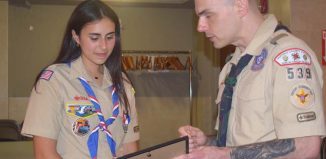Middle School Students Ramp Up Their Engineering Learning
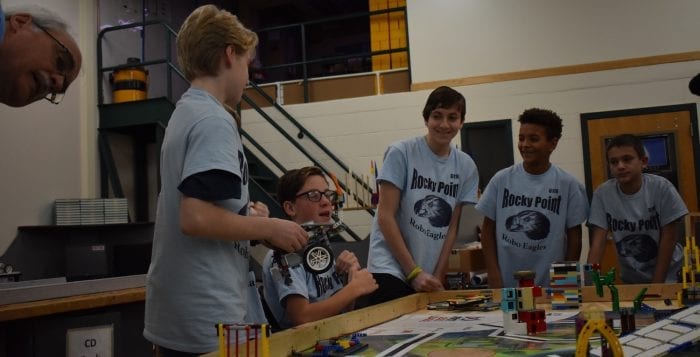
Alex Grundmann presses the button on the LEGO robotics piece, and he and his five teammates stare with held breath at the small four-wheeled device as it rolls down the table. The little machine, programmed and built by them from LEGOs, moves and pushes a tower to the correct position a few feet from its start. It’s just one task the students programmed it to do.
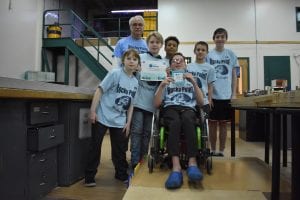
Alex, 14, is just below eye height with his fellows on the Rocky Point Middle School Robotics team, but normally, that’s not the case. As he’s bound to a wheelchair because of cerebral palsy, he’s often a good foot lower to the ground and unable to reach the table at competitions that are about 3 feet up.
But despite their ages, the students on the team had an engineering mind-set, and their first thought when Alex wanted to join the team in the eighth grade was, simply, why not a ramp?
Alex had participated in the club in sixth grade, which is a beginners course where students do not compete, unlike the other teams for later grades at both the middle and high schools. When it came time for seventh grade, Alex did not compete, saying he was originally daunted, knowing he couldn’t reach up to the tables.
His longtime friend at school, Cooper Peterson, asked him to come join the team.
“When I didn’t come back, you said you should come back and see what we can do,” Alex said of his friend. The coach initially told the student that, if he couldn’t reach the table, he could help in designing and programming, but that easily wasn’t enough for either Alex or anyone else on his team.
The crew first made a ramp prototype out of pallet wood, and then later, Alex’s father, Richard, who works at Riverhead Building Supply, constructed the modern ramp out of varnished plywood. The ramp is made to fold up and roll around on caster wheels.
“Honestly, I’m just happy,” Alex said and looked around at his teammates and coach. “I was a bit discouraged at first, but now I’m happy to meet fantastic people like you guys, to be able to compete and have fun doing it.”
The robotics team also designed a lip for the top portion of the ramp to stop Alex or any other wheelchair-bound participant from accidentally rolling off.
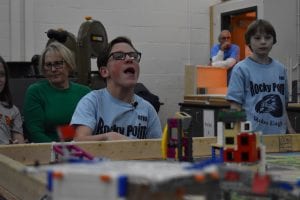
For this year’s FIRST LEGO League qualifiers, the theme of the event was City Shaper, and students were asked to identify a problem in their community and resolve it. Interestingly for team coach Mark Moorman, the parameters of the contest were vague on just what community it was talking about.
“It could be your neighborhood, could be New York,” he said. “In this case, it was the robotics community — the problem with the robotics community is that it wasn’t accessible to kids in wheelchairs.”
The Rocky Point Robo Eagles placed fifth in the “table” section of the competition, which is the technical part of the robotics portion, but came in first for the project research award at the FLL qualifiers at Huntington High School Jan. 25. The team did their research project presentation on Americans with Disabilities Act compliance, and their display board included information about the ADA, details about their ramp and also an interview with FLL co-director Janet Anderson, with a quote saying, “We will try to implement this in our administration and possibly put online instructions to building a ramp on the FLL website,” with an additional promise to perhaps make such a ramp standard throughout the competition in the U.S.
The team got most of its points when Alex was up on the ramp, and with their efforts, the team has qualified for the Long Island championship March 1 at Longwood High School. Teams that place well in that punch tickets to either the nationals or the world tournament.
Anderson declined to comment for the article on the project, saying it would not be fair to the other teams competing in early March.
Alex’s family was amazed at how their young family member and his team pulled this off.
“I’m happy he’s allowed to be included and has something that he likes to do,” his younger sister Ava said. “Because he likes a lot of things, but he really likes robotics.”
Christine Vay, his grandmother, was even amazed at the innovation the students had pulled off.
“It’s such a simple idea, I’m surprised nobody had thought of it before,” she said.
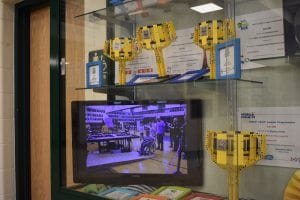
Alex’s mother, Aisha Grundmann, said she has long tried to advocate for her son to never balk at any activity, whether it’s traveling internationally or even driving a boat or BMX riding. Not only is Alex making strides for himself in doing what he wants to do, but he’s also paving the way for others with disabilities to participate.
Moorman echoed the mother’s thoughts, saying this project goes beyond a simple middle school class presentation.
“STEM is absolutely super important, but how many students like Alex are out there and aren’t participating because they physically can’t?” he said. “My guess is the league was just never faced with this.”
Though this may be the first time a young person in a wheelchair showed he could compete in the LEGO competition, Alex’s mother said she doubted it was the first time anyone with such a disability has been discouraged from participating. Parents, she said, should never feel like their child can’t participate.
“It’s about making lives better for everyone else too,” she said.


